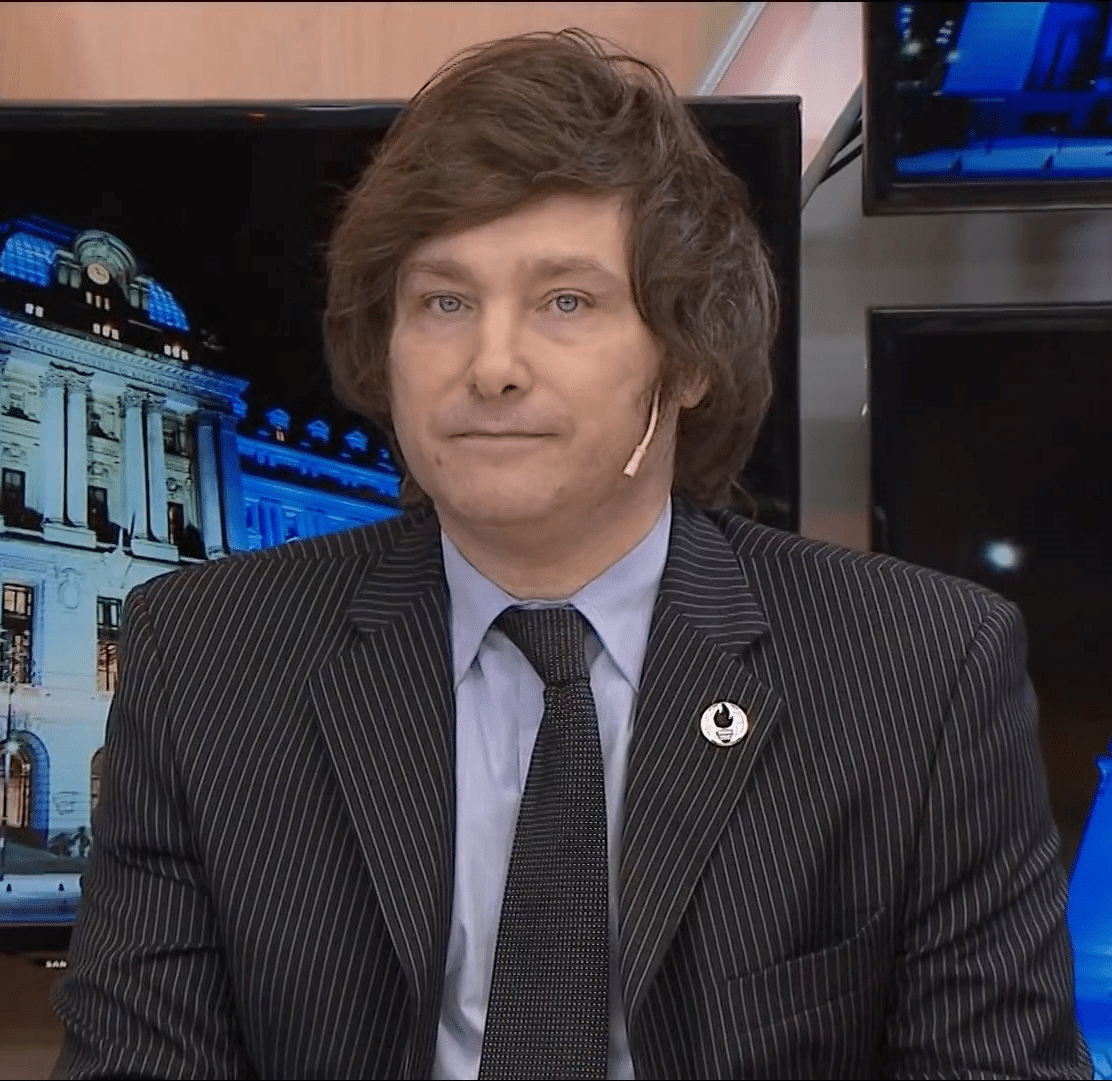
Libertarian and pro-Bitcoin advocate Javier Milei triumphs in Argentina’s primary elections. His calls for dollarization and support for cryptocurrencies offer a stark contrast to traditional economic policies in a nation facing soaring inflation.
Posted August 14, 2023 at 8:04 am EST.
Javier Milei’s triumph in Argentina’s primary elections with 30.06% of the vote has sent shockwaves through the political landscape, marking a significant shift in the nation’s political dynamics. Known for his libertarian views and strong criticism of the Central Bank, Milei’s victory is seen as a reflection of social discontent and a call for change.
The election results saw political party ‘Juntos por el Cambio’ coming in second with 28.26%, divided between Patricia Bullrich (17%) and Horacio Rodriguez Larreta (11.26%). In third place was ‘Unión por la Patria,’ divided between Sergio Massa (21.39%) and Juan Grabois (5.86%).
Milei’s stance on cryptocurrencies, particularly Bitcoin, has been a notable aspect of his political persona. He has expressed strong criticism towards the Central Bank of Argentina, calling it a scam, and has referred to Bitcoin as a system that returns money to its original creator, the private sector.
Milei has asserted that Bitcoin is in a position to compete with other currencies and represents a natural reaction against the fraud of central banks, a sentiment echoed across the Bitcoin community.
His economic views, including his stance on cryptocurrencies, resonate with a segment of the population frustrated with high inflation rates, economic instability, and political corruption. His call for the elimination of the Central Bank and his support for Bitcoin as a tool that can compete with other currencies aligns with his broader libertarian philosophy.
However, Milei’s approach to cryptocurrencies is nuanced. While he has a favorable attitude towards crypto, he has not advocated for Bitcoin’s use as legal tender within Argentina, unlike El Salvador. Rather than advocating for the use of Bitcoin as legal tender, he has proposed the idea of converting the economy to the U.S. dollar, especially in light of Argentina’s current struggle with inflation, which has reached a three-digit percentage rate.
Milei has been involved in controversies related to crypto investments, such as recommending investment in CoinX, which later turned out to be a pyramid scheme.
The victory of Milei is seen as a surprise, as he managed to achieve results that neither polls nor previous provincial elections had anticipated. He became the most-voted candidate, positioning the libertarian party as a key player in the country’s governance for the next four years. If the numbers are repeated in October, Milei will be in a second round against Patricia Bullrich, marking a significant political shift.
Milei’s triumph also represents a protest vote, reflecting social dissatisfaction with the current political leadership. The low participation in the elections, with only 69% of the electorate voting, the lowest in presidential elections since 1983, further emphasizes the social reprobation towards the government and opposition alike.
The result of the elections is a manifestation of a broader social movement that seeks profound changes in the paradigms that have prevailed in Argentina. Whether it’s his call for the elimination of the Central Bank, his support for Bitcoin, or his general libertarian views, Milei represents a break from the traditional political mold.
- SEO Powered Content & PR Distribution. Get Amplified Today.
- PlatoData.Network Vertical Generative Ai. Empower Yourself. Access Here.
- PlatoAiStream. Web3 Intelligence. Knowledge Amplified. Access Here.
- PlatoESG. Automotive / EVs, Carbon, CleanTech, Energy, Environment, Solar, Waste Management. Access Here.
- PlatoHealth. Biotech and Clinical Trials Intelligence. Access Here.
- ChartPrime. Elevate your Trading Game with ChartPrime. Access Here.
- BlockOffsets. Modernizing Environmental Offset Ownership. Access Here.
- Source: https://unchainedcrypto.com/pro-bitcoin-milei-wins-primary-elections-argentina/
- :has
- :is
- :not
- 11
- 14
- 2023
- 28
- 30
- 8
- a
- Achieve
- across
- advocate
- advocating
- against
- Aligns
- alike
- also
- am
- and
- Anticipated
- approach
- ARE
- Argentina
- AS
- aspect
- At
- attitude
- AUGUST
- Bank
- Banks
- BE
- became
- been
- between
- Bitcoin
- Bitcoin Community
- Break
- broader
- call
- calling
- Calls
- CAN
- candidate
- central
- Central Bank
- Central Bank of Argentina
- Central Banks
- change
- Changes
- coming
- community
- compete
- contrast
- converting
- Corruption
- country’s
- creator
- criticism
- crypto
- crypto investments
- cryptocurrencies
- currencies
- Current
- discontent
- divided
- Dollar
- dynamics
- echoed
- Economic
- economy
- el
- El Salvador
- Election
- Elections
- emphasizes
- especially
- expressed
- facing
- favorable
- For
- four
- fraud
- from
- frustrated
- further
- General
- governance
- Government
- had
- Have
- he
- High
- High inflation
- his
- HTTPS
- idea
- if
- in
- Including
- inflation
- Inflation Rates
- instability
- investment
- Investments
- involved
- IT
- ITS
- juan
- Key
- known
- la
- landscape
- later
- Leadership
- Legal
- LEGAL TENDER
- light
- Low
- lowest
- managed
- marking
- money
- movement
- nation
- Nations
- Natural
- Neither
- next
- nor
- notable
- numbers
- october
- of
- offer
- on
- only
- opposition
- or
- original
- Other
- out
- participation
- particularly
- party
- percentage
- philosophy
- Place
- plato
- Plato Data Intelligence
- PlatoData
- player
- policies
- political
- population
- POR
- position
- positioning
- posted
- presidential
- previous
- primary
- private
- private sector
- profound
- proposed
- protest
- Provincial
- Pyramid
- Pyramid Scheme
- Rate
- Rates
- rather
- reached
- reaction
- recommending
- referred
- reflection
- related
- repeated
- represents
- Resonate
- result
- Results
- returns
- round
- s
- Salvador
- saw
- Scam
- scheme
- Second
- sector
- Seeks
- seen
- segment
- sent
- sentiment
- Sergio Massa
- shift
- significant
- since
- soaring
- Social
- stark
- strong
- Struggle
- such
- support
- surprise
- system
- Tender
- than
- that
- The
- Third
- Through
- to
- tool
- towards
- traditional
- Turned
- u.s.
- u.s. dollar
- unlike
- use
- victory
- views
- Vote
- Voting
- was
- whether
- which
- while
- will
- Wins
- with
- within
- years
- zephyrnet












